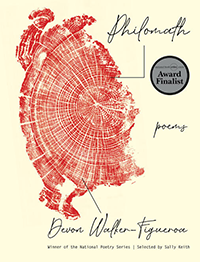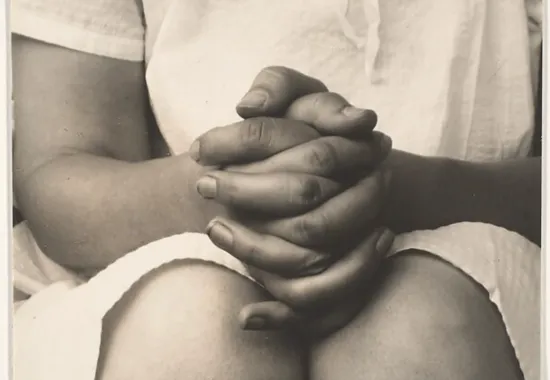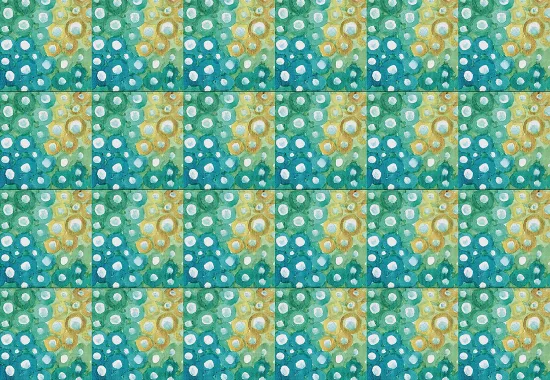Sustaining the Sense of Beginning, A Review of Devon Walker-Figueroa's Philomath
In “Next to Nothing,” near the end of her worthwhile debut poetry collection, Philomath, Devon Walker-Figueroa writes, “I have tried to preserve the sense / of beginning.” At face value, her objective—the “sense” (i.e., this feeling) of something new and creative—resists being preserved since this something risks losing its essence and becoming stale. How does one keep something fresh? Walker-Figueroa’s poetry holds this conundrum as she moves through the fluid, in-between space within modern poetry’s “make it new” spirit. In this collection, she navigates from place of constraint to one less constrained where she creatively expresses herself, and she emphasizes this movement and tension through her poetic skills in keen spatial awareness, language, and associations.
Throughout this collection, varied whitespace within a poem’s lines echoes the pulling apart and contracting of the speaker’s emotional state. The first of three “Out of Body” poems lyrically reveals the burning of Walker-Figueroa’s mother’s belongings after she died:
rickety hand-me-down chest claw-
footed and full of sepia scowls and strips of the old comic
“Love is…” her silk scarf fluttering like an oriflamme her
lock of hair color of mine bound in a blue ribbon tangling
with itself
In these long lines, Walker-Figueroa packs fire-vibrant language and a hooked tenderness for her mother. There’s not as much whitespace for the reader to absorb these intimate connections. The burning expands this horizontal tension, which literally pulls apart the poem (and emotive resonance) into the crackle of fragments:
fingerprints flame-kicked arms feet
auburn curls
what the air cannot hold
it leaves on the tongue
The lack of punctuation and these pulled apart lines give the poem an unconstrained quality of letting go. At the same time, it comes at a cost: a more vivid yet fragmentary attempt reaching for more connection with her mother—even if with fire itself (not just a generic “lock of hair” but “auburn curls”) and ultimately a connection that stays with the speaker “on the tongue” that seems unfinished (no period).
Not only is there spatial awareness within the poetic line but also in the enjambments. In “King’s Valley,” for instance:
My mother is trying to
be the good hostess
she hopes I’ll one day grow
into, schooling a girl named Mynda
toward the GED we all say
stands for Goodness Ends
in Degrees,
Despite her mother “trying to,” there’s no expected action on the next line. There’s just a state of being (“be”) as a hostess—a more domestic role, not even one as an educator. This strong enjambment undercuts the mother’s actions to educate. While there’s also this hope that “Goodness” ends in a degree, as in she (and Walker-Figueroa) value this educational goal; the strong enjambment suggests that goodness itself is ending in degrees, as in slowly by degrees.

The ambivalence in this passage undermines Walker-Figueroa’s first line of the book: “‘Love of learning’ is what / Philomath means.” Unfortunately, here and elsewhere, Walker-Figueroa seems to aim steering the collection toward this “love of learning” framework. which usually involves a kind of curiosity. While Walker-Figueroa does have learning moments throughout, a “love of learning” is just not evident. This misleading framework, though, is minor compared to the strong poetry here.
In the first three parts, she examines relationships and misconstrued places in her youth, attempting to preserve the beginning she lived through in and near Philomath, Oregon. Her poetry enacts a tension of constraint (imposed upon her) in a given place and her desire to leave and expand beyond it. Within this spatial tension, Walker-Figueroa provides other sublime effects, as in “After Birth”:
about bearing false witness. & I think I know
by now that knowing involves the sense turning a touch
licentious. My parents haven’t known each other
in years & no one wants to know me either. A tree falls
in the woods. Con- sensus leaves us cold, etc. Green
Eggs and Ham, I really dislike that kid’s book
This free association (from the bible to Dr. Seuss) is just one example of the collection’s primary poetic organizing principal. It’s a poetry of transition from one literal (and sometimes figurative) place to another, never keeping still. It echoes an indeterminacy that seems to bring out Walker-Figueroa’s “sense / of beginning.”
In this passage, there’s also one of many moments of sublime spatial play with language. The word “consensus” indicates agreement, which isn’t in agreement with itself because the word’s broken up. The first part “con” is a prefix meaning “with.” It’s a word meaning “opposing opinion” (the old English root being connen, to know—thus playing off the biblical sexual “knowing” earlier in the poem), and it’s also a word meaning “something designed to swindle, to trick.” “Con” itself has tension in these meanings, perhaps indicative of those sexual awakening tensions in a fourteen-year-old female starting her period, upon which the poem expands. The second part, “sensus,” is the homophone for “senses”—which “leaves us cold” implies sexuality not yet awakened. This language play isn’t isolated. Walker-Figueroa’s poetry lies deep in the thicket of language entangling the roots of her emotion.
The last part of the book seems to transform that “sense / of beginning.” In general, there’s a shift in focus from the beginning of Walker-Figueroa’s youth to her sense of beginning when she learns art, expressing herself in sculpture, dance, music, and implicitly writing. The arts seem to give her a way to move forward. But forward from what?
“The house is suffering / from a curse,” her sister says in “Golden.” In “Ascent,” “my sister teaches me / to relieve the ache I imagine / God only gives the wicked.” Her father says of her youth in “Of Gut & Gold”: “gone / far from what my father calls / his Canaan.” Throughout the collection, there’s this sin and wickedness seemingly imposed upon her and her family, a feeling clothed in religious language.
By the end, especially in the last poem “Gallowed Be”— which plays off of “hallowed be thy name…”—Walker-Figueroa seemingly accepts things for how they are, “every story is / ashamed to be true. My father’s now / a widower & no one / is to blame,” accepting even in her “low / life & lowly frame of mind.”
She resists, though, this bowtie ending of acceptance. Rather, her poetry undercuts it with the doom-aware title and especially by the strong, insistent rhymes ending the poem:
…My sister braids my waist-
length mane, says, “This
place is lame.” I try to tell her
no one is to blame, but the sky is
so hollow it swallows every name.
It’s as if Walker-Figueroa is telling herself, not only her sister and reader, that no one is to blame—whether she believes it or not. The “waist”/waste homophone, strong enjambment, prominent rhymes, and the idea of “mane”—a reference to her first name being “Devon” because her mom loved horses— add depth to this slant of tone in her being stuck/unstuck. Walker-Figueroa skillfully retains the creative tension pervasive throughout this collection, coming close to preserving her sense of beginning by enacting it in art, her poetry, and by resisting the urge to wrap it up.
Recommended
A Review of Apostasies by Holli Carrell
A Review of Abiding Time by Robert McNamara






